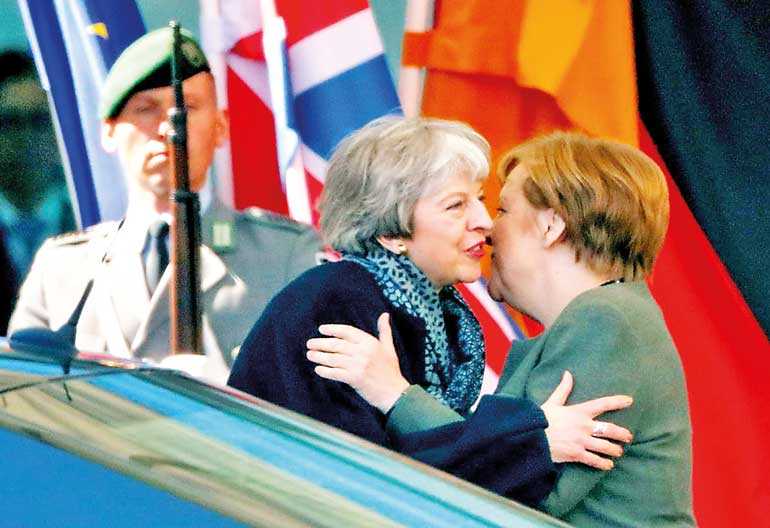Sunday Feb 22, 2026
Sunday Feb 22, 2026
Wednesday, 10 April 2019 00:24 - - {{hitsCtrl.values.hits}}

BERLIN/PARIS (Reuters): Prime Minister Theresa May on Tuesday met Angela Merkel, Europe’s most powerful leader, to seek support for a new Brexit delay while her ministers tried to break the deadlock in London at crisis talks with the Labour Party.
More than a week after the United Kingdom was originally supposed to have left the EU, the weakest British leader in a generation has said Brexit might never happen as she battles to get a divorce deal ratified by a divided parliament.
With little sign of a resolution in London, May dashed to Berlin ahead of a meeting with French President Emmanuel Macron, to seek support for her request to delay Brexit a second time, from 12 April to 30 June.
May met Merkel at her riverside Chancellery, a short walk from the Brandenburg Gate, where Ronald Reagan in 1987 urged Mikhail Gorbachev to “Tear down this wall!” - the barrier that had divided West and East Berlin since 1961.
While Merkel and May discussed Brexit inside, the opposition liberal FDP party drove an advertising van past the Chancellor’s office with a message for May: “Dear Theresa May. Just do it. Stop Brexit. Make the most of Europe’s opportunities.”
May and Merkel exchanged kisses on departure, with the German leader waving farewell as May headed to Paris to meet Macron at the Elysee Palace.
On the eve of an emergency EU summit in Brussels, chief EU Brexit negotiator Michel Barnier said the bloc was ready to grant a delay, but that the duration “has got to be in line with the purpose of any such extension”.
“Any extension should serve a purpose. The length should be proportional to the objective. Our objective is an orderly withdrawal,” Barnier told a news conference in Luxembourg.
“No-deal will never be the EU’s decision. In order to avoid no-deal, the UK needs to agree to a deal,” Barnier said.
EU leaders, fatigued by the three-year Brexit crisis, have repeatedly refused to renegotiate the Withdrawal Agreement that May agreed in November. Barnier repeated that, though he held open the option of agreeing much closer post-Brexit ties. The pound, which has seesawed so much on Brexit news that some investors have stepped away from the sterling market, rose and then dipped on speculation Merkel could offer May a better deal. Germany denied that.
The 2016 referendum revealed a United Kingdom divided over much more than EU membership, and has sparked impassioned debate about everything from secession and immigration to capitalism, empire and what it means to be British.
Yet nothing is resolved and many opponents of Brexit say the whole divorce is at risk, especially if there is a long delay.
Unable to convince enough of her own Conservatives of the merits of her deal to get it passed, May is courting socialist Jeremy Corbyn, whose Labour Party wants to keep Britain more closely tied to the bloc after Brexit.
Talks between Labour and May’s government continued. Labour’s demands include keeping Britain in a customs union with the EU, something that is hard to reconcile with May’s desire for Britain to have an independent trade policy, and a second referendum on any deal.